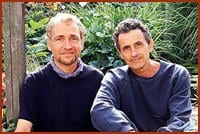In August 1975, Patrick Lima and John Scanlan turned their backs on life in Toronto and relocated to an uncultivated five-acre field on the Bruce Peninsula of Georgian Bay. Together, they lived close to the land, built a home and a garden, Larkwhistle. Its lush flower and vegetable beds have become famous across Canada, and the garden is a magnet, drawing thousands of visitors every year.
Over the past 30 years, Lima has charted his gardening experience in the harsh Canadian climate over four definitive Canadian gardening books, illustrated with Scanlan’s evocative photographs.
“John and I live on a good piece of land,” says Lima. “Our garden is essential to our lives and we know how to take care of ourselves from it. But that doesn’t mean we’re apathetic.”
Lima’s reputation as a gardener and author allows him to articulate his concerns, ensuring people’s attention when he writes or talks. But he has made another important decision.
“Last winter I decided to live more simply, more within the limits of the earth. Rather than heading south to the sun, I stayed put at Larkwhistle. I altered my eating habits and lived mainly on produce from our garden, stored in our root cellar, or local food,” he says.
Their life seems ideal, but recently an ominous cloud has appeared on the horizon.
“I want to speak of the state and the fate of the environment,” Patrick began a recent talk in Ottawa sponsored by the Ottawa Botanical Garden Society. “I want to talk about how we live on the earth-how we affect it and how we are affected in turn. The future is close enough to see and predict.”
The scientific analysis of climate change leaves out the human element, says Lima. Humans have a deep bond with the earth, but it’s a relationship that’s taken for granted too often. What is happening, he says, amounts to ecocide, the gradual destruction of the natural elements.
“Everyone needs to be more aware of the state of the world today. It’s too easy to dismiss what is happening, to turn away and be silent.”
Lima is angry about what is happening: angry at politicians and business leaders who block change, who talk and talk and take no action; angry at those who think it is okay for people in countries, such as China, to work for low wages so consumers in “the over-developed world” can buy goods more cheaply.
“Anger is a source of action. It moves me to speak out so people will begin to protect what they care about — what is essential. Anger keeps me from tipping into despair. We need to make changes now.”
When his deepest longing met the world’s greatest need, he knew the path to follow.
As he has done for many years, Scanlan took off for India this year to volunteer for three months with a Canadian charitable organization which helps impoverished children. There, he continued to pursue his photography.
“The scope of global problems can lead to apathy, depression and despair. But I resist that. Humans are capable of a range of emotions that can exist side by side. I often feel sad about the state of the planet, but that doesn’t cancel out my sense of curiosity and joy — my delight in nature,” says Lima.

 Why you can trust Xtra
Why you can trust Xtra


